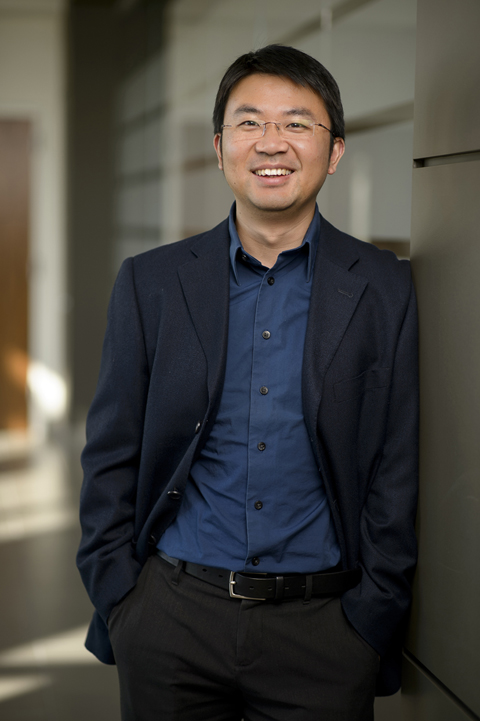Purdue Profiles: Mingji Dai
November 18, 2014
 |
|
Mingji Dai, assistant professor of chemistry. (Purdue University photo/Charles Jischke) |
Through his lab and his teaching, Mingji Dai helps create and tweak some of the universe's tiniest building blocks: molecules.
Dai, who is an assistant professor of chemistry, works with his postdoctoral researchers, graduate students and undergraduate students to develop new methods and strategies to create and edit important organic molecules, particularly those with therapeutic potential for treating various human diseases.
These efforts are part of Purdue Moves, which, among many other things, seeks to use the University's expertise to engineer cures for devastating diseases.
What are the details of your lab's work?
My lab is an organic synthesis lab that is affiliated with Purdue's Center for Cancer Research and Center for Drug Discovery. In the lab, we design and synthesize molecules with potential biological and medicinal applications. Some of the molecules we make have anti-cancer activity. Some have neurotrophic activity, which means they could help fight neurodegenerative diseases such as Alzheimer's and Parkinson's diseases. We also work on molecules with anti-bacterial activity, particularly activity against drug-resistant bacteria.
A majority of the molecules we work on are naturally occurring. They are called as small molecule natural products. They are scarce and complex, but they have shown some important biological activities. Therefore, they are potential lead compounds for drug discovery. We develop new synthetic methods and strategies to prepare these molecules and their analogs and optimize their properties for possible refinement into drugs that could eventually enter clinical trials.
We also design and create unnatural small molecule libraries with novel and diverse structures. If you compare each molecule to a book, then when you put them together, you have these libraries you can use to search for certain functions within a group of molecules. This is important because there are a lot of disease targets that cannot be targeted with the pharmaceutical industry's current small molecule library collections. We need molecules with novel, diverse and complex structures.
Additionally, we are interested in developing probe molecules, which could enable the study of some fundamental and important biology and disease problems. For example, in collaboration with Professor Ji-Xin Cheng’s lab, we have developed cholesterol probe molecules with Raman tags to study cholesterol incorporation, storage and trafficking.
What's an example of a recent discovery your lab has made?
In the last two years, we have synthesized natural products with potent anti-cancer activity and neurotrophic activity. From the small molecule libraries generated in our lab, we have recently identified new compounds with potent activity against drug-resistant bacteria in collaboration with Professor Mohamed Seleem’s lab.
Antibiotic resistance has emerged as one of most serious public health concerns of the 21st century. Therefore, it's exciting to think that some of the molecules we are working with may have the potential to treat antibiotic resistance in the future. Of course, there are many hurdles to cross before reaching such a goal.
In addition to operating your lab, what classes do you teach?
Since arriving Purdue in 2012, I've primarily taught two classes. In the fall, I teach an advanced organic chemistry class to mainly graduate students. In the spring, I teach an intermediate organic chemistry class to junior and senior undergraduates.
In these classes, we spend a lot of time talking about molecular structure and reactivity, reaction mechanisms, and synthetic methods. We also discuss about how organic synthesis can impact other closely related interdisciplinary fields. I enjoy teaching. Overall, I really like to watch students learn and grow, and to watch them discover new things about chemistry every day. In turn, sometimes my students inspire me with research ideas.
What are other enjoyable aspects of your job?
For me, Purdue is just a great place to be. Our chemistry department is one of the top in the country -- we've had two chemists win Nobel prizes, for example. The University also has a great Faculty Scholar program and many other initiatives and programs that support world-class research.
Further, Purdue is a place where scientists in my field, organic chemistry, can do work that might translate into clinical medicine through the drug discovery process. Purdue promotes collaboration, and we have a lot of partnerships with other researchers on campus. These collaborations help us dream big.
Writer: Amanda Hamon Kunz, 49-61325, ahamon@purdue.edu

